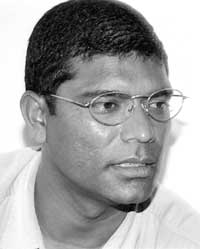 Fed up with a faraway capital that doesn't care about the welfare of people living in the remote and roadless parts of western Nepal, five districts of the Karnali Zone have decided to set up their own development solidarity.
Fed up with a faraway capital that doesn't care about the welfare of people living in the remote and roadless parts of western Nepal, five districts of the Karnali Zone have decided to set up their own development solidarity. Called the Common Karnali Development Group, it will have members from local government combines, non-government organisations and civil society. "If Kathmandu keeps neglecting us, we want to show that we Karnali people can take care of ourselves," says Jivan Shahi, former DDC chairman of Humla.
Karnali's main problems are its remoteness, the lack of investment in development from the central government, chronic food shortage, lack of salt and poor public health services. Yet, Karnali is endowed with great biodiversity, natural beauty and human resources which if properly utilised could lift the region out of poverty, the group believes. "We will show them that we can be self-sufficient," Shahi said. "In five years, we will not be living hand-to-mouth anymore."
The group has prioritised improvements in transport, agriculture and tourism. Another member of the group, Deep Bahadur Shahi of the Kalikot DDC says, "We went through the Panchayat, 12 years of democracy, and the Karnali has remained where it was. Karnali is the only zone without a graduate college or a road. They start roads, and they never complete them on some pretext or the other. Sometimes the excuse is Maoists, sometimes it is lack of budget. They have Maoists in other zones, too, don't they?"
As an example, Shahi points to Salleri (Phaplu) airport in Solu Khumbu, which was put out of action by Maoists. It has since resumed operation. Maoists attacked Dolpo airport, but planes have still not started flying there. The same thing has happened to the Surkhet-Jumla road, where construction has stopped because of the security situation.
The main reason for lack of development is the lack of connections in high places in Kathmandu. Mohan Baniya is from the Mugu DDC and says Karnali should be declared a "Special Zone" so its gets priority treatment for development. "Mugu's average lifespan is 36, this is less than sub-Saharan Africa," says Baniya.
The group argues that Karnali has been neglected by Singha Darbar because it is remote. Mugu, Humla and Kalikot don't even have airports. Dolpa has been out of action because of Maoists. Karnali has been pushed further back because of the Maoist insurgency, the destruction of bridges, food supply and pulling out of development projects.


